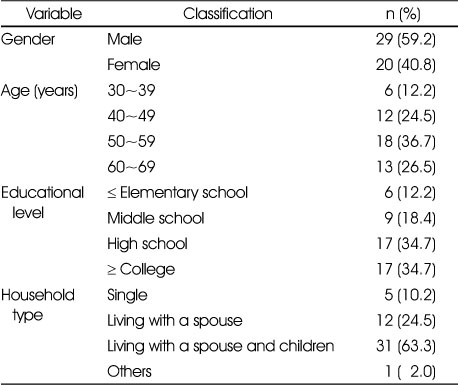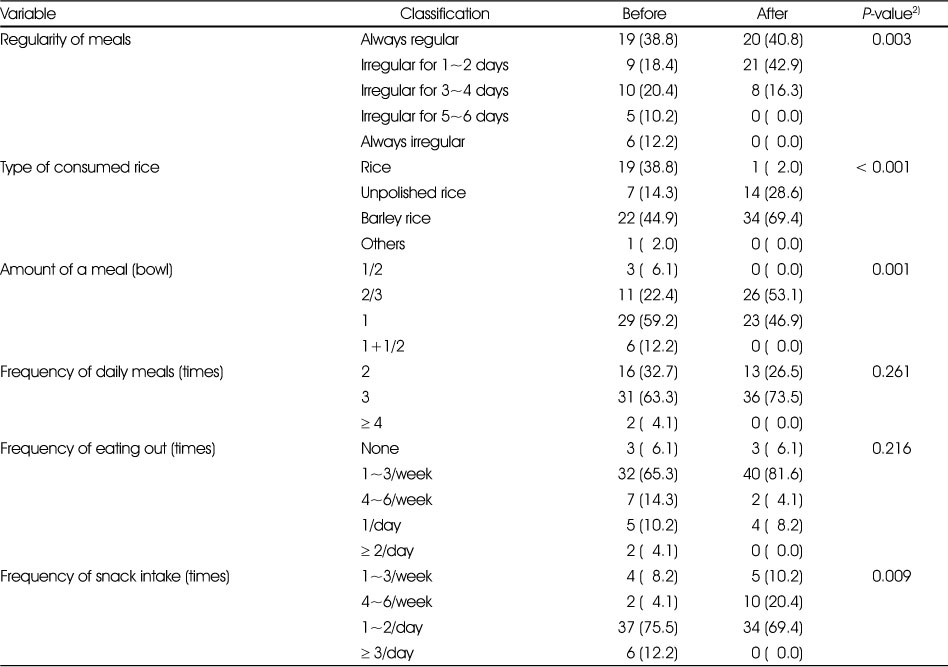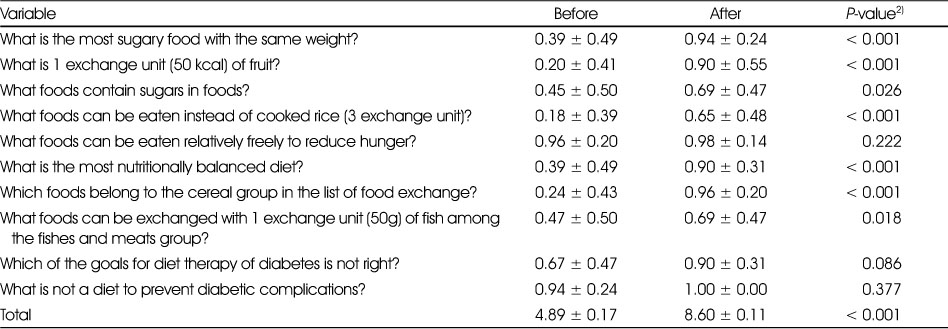Articles
- Page Path
- HOME > Korean J Community Nutr > Volume 25(3); 2020 > Article
- Research Article
- Effect of Nutrition Counseling by Nutrition Care Process on Diet Therapy Practice and Glycemic Control in Type 2 Diabetic Patients
- Tae-Jeong Bae, Na-Eun Jeon, Soo-Kyong Choi, Jung-Sook Seo
-
Korean Journal of Community Nutrition 2020;25(3):214-225.
DOI: https://doi.org/10.5720/kjcn.2020.25.3.214
Published online: June 30, 2020
2Student, Department of Food and Nutrition, Yeungnam University, Gyeongsan, Korea
3Professor, Department of Food and Nutrition, Ulsan College, Ulsan, Korea
4Professor, Department of Food and Nutrition, Yeungnam University, Gyeongsan, Korea
-
Corresponding author:
Jung-Sook Seo,
Email: jsseo@ynu.ac.kr
- 1,567 Views
- 58 Download
- 4 Crossref
- 0 Scopus
Abstract
Objectives
This study examined the effects of nutrition counseling by the nutrition care process (NCP) on diet therapy practice and glycemic control in patients with type 2 diabetes mellitus.
Methods
The survey was conducted on 49 patients whose hemoglobin A1c (HbA1c) level ranged from 6.5% to below 10% among patients aged 30∼60s with type 2 diabetes mellitus. Nutrition counseling by the NCP process was carried out twice: first nutrition counseling and follow up counseling. The questionnaires were composed of 54 questions in five fields (general characteristics, health-related behaviors, diet therapyrelated items, dietary life, diet therapy-related knowledge, diet therapy-related barriers). Nutrition intervention in nutrition counseling was performed based on the individualized diagnosis of NCP.
Results
All the subjects practiced self-monitoring of their blood glucose levels, regular exercise, and diet therapy after NCP-based nutrition counseling. Diet therapy-related knowledge and practice by the subjects were improved after nutrition counseling. While the intake of boiled white rice decreased, the intake of boiled brown rice and barley rice in the subjects increased significantly. After nutrition counseling, the weight and HbA1c of the subjects decreased.
Conclusions
These results suggest that personalized nutrition counseling by NCP process is effective for diet therapy compliance and glycemic control of type 2 diabetic patients.
Published online Jun 30, 2020.
https://doi.org/10.5720/kjcn.2020.25.3.214
Effect of Nutrition Counseling by Nutrition Care Process on Diet Therapy Practice and Glycemic Control in Type 2 Diabetic Patients
Abstract
Objectives
This study examined the effects of nutrition counseling by the nutrition care process (NCP) on diet therapy practice and glycemic control in patients with type 2 diabetes mellitus.
Methods
The survey was conducted on 49 patients whose hemoglobin A1c (HbA1c) level ranged from 6.5% to below 10% among patients aged 30~60s with type 2 diabetes mellitus. Nutrition counseling by the NCP process was carried out twice: first nutrition counseling and follow up counseling. The questionnaires were composed of 54 questions in five fields (general characteristics, health-related behaviors, diet therapy-related items, dietary life, diet therapy-related knowledge, diet therapy-related barriers). Nutrition intervention in nutrition counseling was performed based on the individualized diagnosis of NCP.
Results
All the subjects practiced self-monitoring of their blood glucose levels, regular exercise, and diet therapy after NCP-based nutrition counseling. Diet therapy-related knowledge and practice by the subjects were improved after nutrition counseling. While the intake of boiled white rice decreased, the intake of boiled brown rice and barley rice in the subjects increased significantly. After nutrition counseling, the weight and HbA1c of the subjects decreased.
Conclusions
These results suggest that personalized nutrition counseling by NCP process is effective for diet therapy compliance and glycemic control of type 2 diabetic patients.
Fig. 1
Nutrition intervention achievement rate of the subjects
Table 1
General characteristics of the subjects (n=49)
Table 2
Diabetes-related factors of the subjects
Table 3
Nutrition diagnositic analysis of the subjects
References
-
International Diabetes Federation. IDF Diabetes atlas ninth edition 2019 [Internet]. International Diabetes Federation; 2020 [cited 2020 Apr 22].Available from: https://diabetesatlas.org/upload/resources/material/20200302_
133351_ IDFATLAS9e- final- web.pdf#page=38&zoom=auto.
-
-
Korean Diabetes Association. Diabetes fact sheet in Korea 2018 [Internet]. Korean Diabetes Association; 2018 [cited 2018 May 23].Available from: http://www.diabetes.or.kr/pro/news/admin.php?code=admin&category=A&number=1546&mode=view.
-
-
Lee SH, Kim HL. Comparison of health behaviors, diabetes mellitus (DM) management and health-related quality of life (HRQoL) between DM groups with and without diabetic education experience. Korean Society Rural Med Community Health 2018;43(2):85–96.
-
-
Choi KI, Jung DY. The relationships between knowledge of diabetes, barrier and compliance with sick role behavior of diabetic patients. Health Nurs 2010;22(2):13–26.
-
-
Kang JK. Special edition: Concept of lifestyle-related disease. Korean J Med 2003;65(1):121–126.
-
-
Yoo JS, Lee SJ, Lee HC, Kim SH, Kang ES, Park EJ. The effects of short term comprehensive life style modification program on glycemic metabolism, lipid metabolism and body composition in type 2 diabetes mellitus. J Korean Acad Nurs 2004;34(7):1277–1287.
-
-
Lee JH, Jeon HJ, Kim KA, Nam HW, Woo JT, Ahn KJ. Diabetes education recognition program. J Korean Diabetes 2012;13(4):219–223.
-
-
Jun JE, Lee YM, Oh YJ. A factor analysis study on blood glucose control in diabetics mellitus patients (1)-focus on blood glucose control and lifestyle factors. Korean J Community Nutr 2009;14(2):236–244.
-
-
Raidl M, Spain K, Lanting R, Lockard M, Johnson S, Spencer M, et al. The healthy diabetes plate [Internet]. Centers for Disease Control and Prevention; 2007 [cited 2018 May 23].Available from: http://www.cdc.gov/pcd/issues/2007.jan/06_
0050.htm.
-
-
American Dietetic Association. International dietetics and nutrition terminology (IDNT) reference manual: standardized language for the nutrition care process. Chicago: American Dietetic Association; 2008.
-
-
Seo JS, Kim EM, Park MS, Son JM, Woo MH, Wie KE, et al. In: Job standards and practical toolkits for clinical nutrition therapy: diabetes mellitus·cancer·dyslipidemia. Sejong: Ministry of Health and Welfare; 2014. pp. 3-68.
-
-
Chang MH, Jung SJ. Effects of nutrition education and exercise program on obesity index and behavioral modification in moderate obese women. Korean J Community Nutr 2018;23(4):318–332.
-
-
Yeo SJ, Kim BH. Effects of an intensive management program for diabetic patients on a blood biochemical profile and diabetes knowledge. Korean J Community Nutr 2018;23(2):148–161.
-
-
Hoogeveen EK, Kostense PJ, Beks PJ, Mackaay AJ, Jakobs C, Bouter LM. Hyperhomocysteinemia is associated with an increased risk of cardiovascular disease, especially in non-insulin-dependent diabetes mellitus: a population-based study. Arterioscler Thromb Vasc Biol 1998;18(1):133–138.
-
-
Choe SJ, Park HR, Park DY, Ahn HS. A study on the sociopsychological factors influencing the dietary compliance of diabetics by using focus group interview. Korean J Community Nutr 2000;5(1):23–35.
-
-
Coppell KJ, Kataoka M, Williams SM, Chisholm AW, Vorgers SM, Mann JI. Nutritional intervention in patients with type 2 diabetes who are hyperglycaemic despite optimised drug treatment-lifestyle over and above drugs in diabetes (LOADD) study: randomised controlled trial. BMJ 2010;341:c3337
-
-
Liu H, Zhang M, Wu X, Wang C, Li Z. Effectiveness of a public dietitian-led diabetes nutrition intervention on glycemic control in a community setting in China. Asia Pac J Clin Nutr 2015;24(3):525–532.
-
-
Chin YR, So ES, Lee HY. A meta-analysis of Korean diabetes patient studies from 1977 to 2008. J Korean Public Health Nurs 2011;25(1):5–16.
-
-
Kim HS. Role of diabetes educators and effectiveness of diabetes education. J Korean Diabetes 2013;14(4):194–198.
-
-
Korea Centers for Disease Control and prevention. Diabetes management status among adults in Republic of Korea, 2008–2012 [Internet]. Korea Centers for Disease Control and prevention; 2014 [cited 2018 May 23].Available from: https://www.cdc.go.kr/board/board.es?mid=a20602010000&bid=0034&list_
no=60457&act=view.
-
-
Lim HS, Chyun JH, Kim YS, Nam MS. Effect of nutrition education on diabetic management in diabetic patients. J Nutr Health 2001;34(1):69–78.
-
-
Song MS, Song KH, Ko SH, Ahn YB, Kim JS, Shin JH. The long-term effect of a structured diabetes education program for uncontrolled type 2 diabetes mellitus patients-a 4-year follow-up. Diabetes Metab J 2005;29(2):140–150.
-
-
Korea Centers for Disease Control and prevention. National Health Statistics 2015 [Internet]. Korea Centers for Disease Control and prevention; 2016 [cited 2020 Jun 26].Available from: https://knhanes.cdc.go.kr/knhanes/sub04/sub04_
03.do?classType=7.
-
-
Statistics Korea. Cause of death statistics [Internet]. Statistics Korea; 2019 [cited 2020 Jun 17].
-
-
Song KE, Kim DJ, Park JW, Cho HK, Lee KW, Huh KB. Clinical characteristics of Korean type 2 diabetic patients according to insulin secretion and insulin resistance. J Korean Diabetes Assoc 2007;31(2):123–129.
-
-
Lee NH, Park YM, Joung HS. A study on diet education of participants in diabetic education at public health center. J Korean Diet Assoc 2007;13(1):84–93.
-
-
Cho JW. Coaching for self-management of diabetes in medical nutrition therapy. J Korean Diabetes 2019;20(3):181–189.
-
-
Kang HJ. Current status and effects of nutrition education programs for diabetic patients in Korea. J Korean Diabetes 2018;19(2):106–112.
-
-
Park GS, Ly SY. Compliance and need assessment for diet therapy among diabetics and their caregivers. Korean J Community Nutr 2003;8(1):91–101.
-
-
Lee SL, Kim YL, Lee SJ, Cho YK, Choi YK, Chun CH, et al. Effects of diabetes education on diabetic management in non-insulin-dependent diabetics mellitus patients. J Korean Diet Assoc 2004;10(3):300–308.
-
-
Kim DE, Hong SH, Kim JM. The relations between diabetic dietary compliance, dietary intake, and physical activity and the prevalence of metabolic syndrome (MS) in Type 2 diabetic patients. Korean J Community Nutr 2015;20(5):351–361.
-
-
Porter JM, Devine A, Vivanti A, Ferguson M, O'sullivan TA. Development of a nutrition care process implementation package for hospital dietetic departments. Nutr Diet 2015;72(3):205–212.
-
-
Charney P. The nutrition care process and the nutrition support dietitian. Support Line 2007;29(4):18–22.
-
-
Lee GJ. Nutrition care process and diabetes: Focus on nutrition diagnosis. J Korean Diabetes 2012;13(1):48–51.
-
-
Corado L, Pascual R. Successes in implementing the nutrition care process and standardized language in clinical practice; Proceedings of ADA 2008 Food & Nutrition conference & Expo; 2008 Oct 26; Chicago, IL. pp. A42.
-

 KSCN
KSCN











 Cite
Cite


